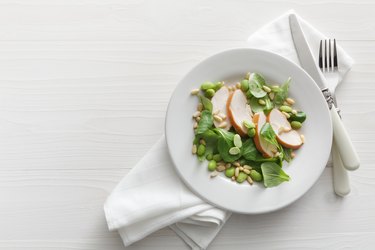
When it comes to finding a diet for losing weight and working out, there seems to be only conflicting information. At some point, you might just feel like giving up rather than sorting through all the varying advice.
However, it is possible to find the a diet to support your weight-loss and workout efforts that will make you feel and look fantastic.
Video of the Day
Video of the Day
Diet Plan for Working Out
Although watching your diet is important all the time, it's particularly vital when you're working out regularly. Your body requires nutrients for muscle recovery, and failing to adequately refuel before and after a workout could sabotage your efforts.
According to the Mayo Clinic, it's best to eat a large meal three to four hours before a workout or a small meal one to three hours before working out. After your workout, consume a blend of protein and carbohydrates within two hours.
The best diet plan while working out is one that's balanced. The body needs complex carbohydrates to fuel muscles for your workout and to replenish that fuel afterward, as well as protein to repair damaged muscle. You also need healthy fats to burn fat.
Top Foods for Your Diet
The best diet plan while working out can include foods such as:
- Avocados: Avocados are an excellent source of fiber and heart-healthy monounsaturated fats. A study published in 2013 in Critical Reviews in Food Science and Nutrition found eight preliminary studies that suggest avocado consumption helps support cardiovascular health. Additionally, according to a small study published in November 2013 in the Nutrition Journal, eating half an avocado can improve satiety for up to three to five hours.
- Full-fat Greek yogurt: Full-fat Greek yogurt is full of whole carbohydrates, protein and filling healthy fat to help you recover from workouts. Greek yogurt has higher protein content than regular yogurt because it is strained to remove more of the liquid whey protein.
- Lean meat: Lean cuts of chicken, fish, and beef are high-protein foods that aid in muscle building. Protein is essential to building muscle because, as shown in a May 2015 study in Biophysical Journal, proteins are enzymes cause reactions in the body essential to your metabolism, such as digestion, energy production, and muscle contraction. Protein helps build new muscle and decrease soreness as the muscles repair themselves. Beef scores extra points for its iron content. A December 2014 study in Medicine & Science in Sports & Exercise determined that low iron levels can lead to anemia, which limits oxygen delivery to exercising muscle. Tissue iron deficiency may affect exercise performance by hampering muscle oxidative metabolism.
- Whole grains: Whole grains provide your body with the carbohydrates it needs for energy production without all the weight gain associated with processed grains such as white bread, cereal and pasta. Eating oats, quinoa and whole-wheat breads, pastas and cereals will give you carbs and fiber to help with digestion and curb your appetite.
Read more: 10 Dos and Don'ts for Using a Food Diary
Daily Calories for Exercise
There's not a one-size-fits-all answer for how many calories you should eat per day when you're working out regularly. The number of calories to eat to lose weight while working out varies depending on the type of workout you're doing, how much you exercise and other factors.
When not trying to lose weight, Health.gov's Dietary Guidelines for Americans recommends that adult men eat between 2,400 and 2,800 calories per day, while adult women should eat between 1,800 and 2,200 calories daily, depending on age and activity level.
To lose weight, the National Heart, Lung, and Blood Institute recommends reducing daily calorie intake by 500 to 750 calories per day to lose 1 to 1 1/2 pounds per week. According to Harvard Health Publishing, men should not consume fewer than 1,500 calories per day, unless they're under the care of a medical professional, while women should not consume fewer than 1,200 calories per day.
- Mayo Clinic: "Eating and Exercise: 5 Tips to Maximize Your Workouts"
- American Heart Association: "Food as Fuel Before, During and After Workouts"
- USDA National Nutrient Database: "Avocados, Raw, All Commercial Varieties"
- Critical Reviews in Food Science and Nutrition: "Hass Avocado Composition and Potential Health Effects"
- Nutrition Journal: "A Randomized 3×3 Crossover Study to Evaluate the Effect of Hass Avocado Intake on Post-Ingestive Satiety, Glucose and Insulin levels, and Subsequent Energy Intake in Overweight Adults"
- Lipids in Health and Disease: "Bovine Milk in Human Nutrition – A Review
- Biophysical Journal: "The Classification and Evolution of Enzyme Function"
- USDA National Nutrient Database: "Ground Beef Calculator: 95% Lean/5% Fat, Raw"
- Medicine & Science in Sports & Exercise: "Recent Advances in Iron Metabolism: Relevance for Health, Exercise, and Performance"
- Health.gov: "Dietary Guidelines for Americans, 2015-2020"
- National Heart, Lung, and Blood Institute: "Healthy Eating Plan"
- Harvard Health Publishing: "Calorie Counting Made Easy"